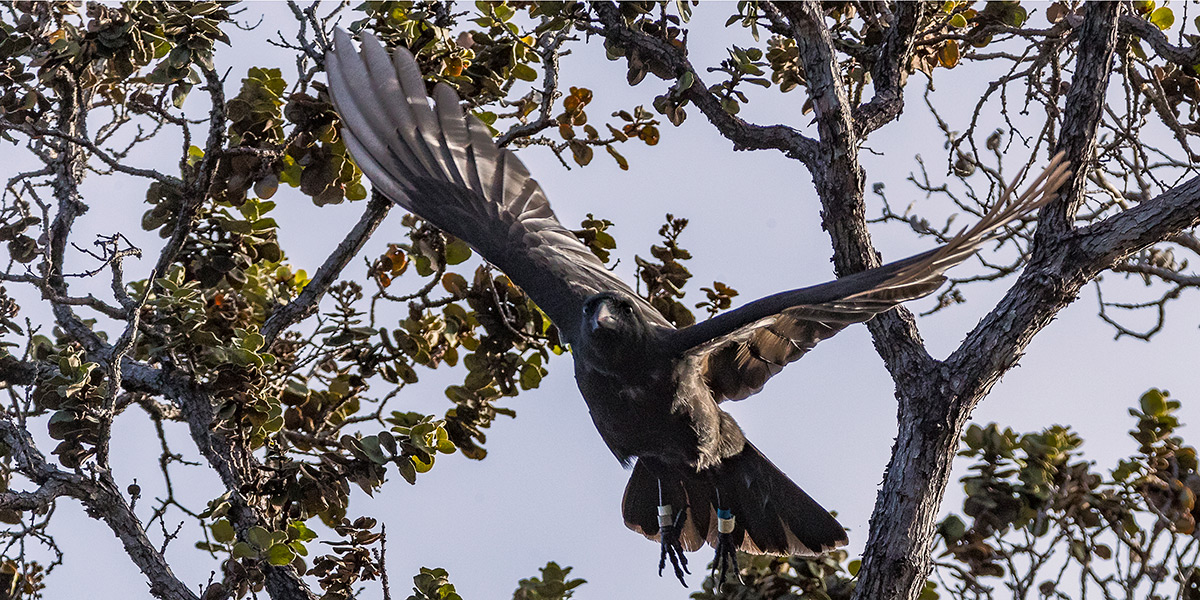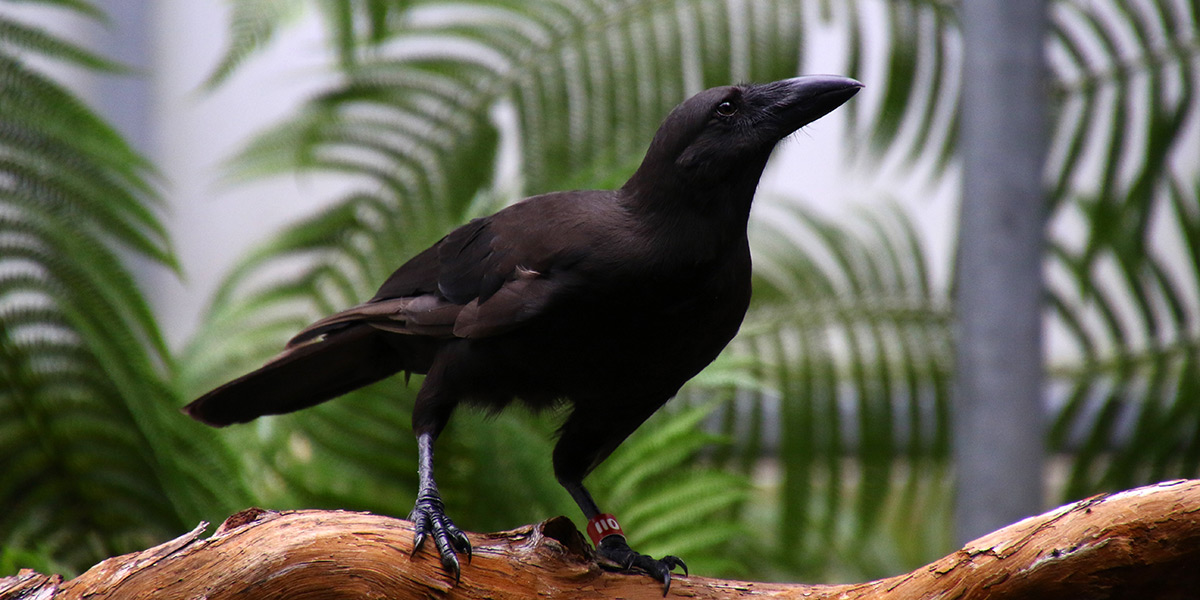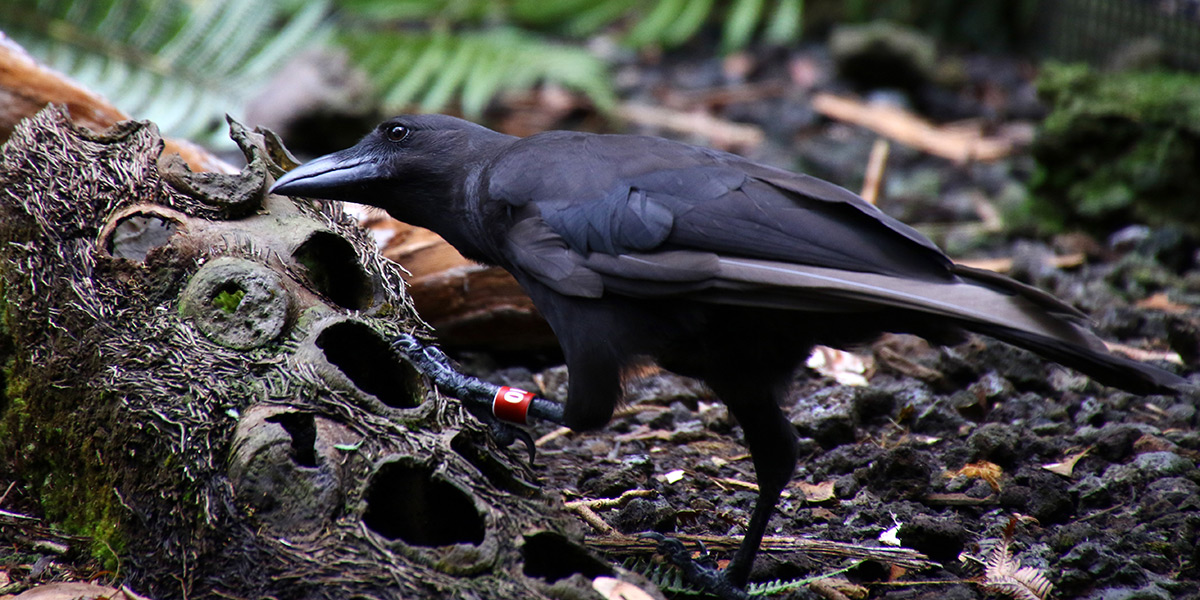Hilo, Hawai‘i – A team from the Tropical Conservation Biology and Environment Sciences program (TCBES) and Biology Department at the University of Hawai‘i at Hilo(UHH)is the latest recipient of support from the Disney Conservation Fund (DCF) for its work to promote successful conservation of the critically endangered ʻAlalā or Hawaiian Crow. The fund has been supporting local efforts around the world aimed at saving wildlife, inspiring action and protecting the planet with more than $75 million distributed to nonprofit organizations since 1995.
The ʻAlalā has great cultural and ecological significance for the people of Hawai‘i and the forests where they live and were once found. An endemic species that was once found in forests throughout Hawai‘i, the ʻAlalā has been extinct in the wild since 2002. Through intensive conservation efforts, 16 ʻAlalā raised in captivity have been released into native forests, representing what conservationists hope will be the start of a self-sustaining population of wild ʻAlalā. Yet, it is unknown whether birds raised in captivity have or can learn the social behaviors needed to live in the wild.
Dr. Kristina Paxton, adjunct assistant professor associated with the Listening Observatory for Hawaiian Ecosystems (LOHE)at UHH said, “Establishing a self-sustaining wild population of ʻAlalā will require flexible and innovative management strategies.” She continued, “Thanks to this $50,000 award from the Disney Conservation Fund, we will be able to do intensive research in collaboration with The ʻAlalā Project, a partnership between Hawai‘i Department of Land and Natural Resources, San Diego Zoo Global, and U.S. Fish and Wildlife Service, to find out if captive reared ʻAlalā are developing new vocalizations as they adapt to new situations encountered in the wild. This information will greatly assist in the conservation efforts of ʻAlalā.”
ʻAlalā have complex and diverse vocalizations that are acquired through social learning over a bird’s lifetime. These vocalizations play an integral role in behaviors including avoiding predators, attracting a mate, and establishing a territory. By researching the vocalizations and associated behaviors, teams working to save the ʻAlalā will be able to better shape successful re-entry into the wild.
The DCF award will also help build community awareness around the importance of forest conservation for ʻAlalā and other endangered forest birds and plants.
“Our work is perfectly suited for education and outreach by bringing the sounds of the forest to the people,” explains Dr. Patrick Hart, a UHH professor of biology collaborating on the project. “We will use the findings of our research to highlight conservation and science through the story of the ʻAlalā and their vocal culture. By partnering with existing outreach programs such as The ʻAlalā Project’s outreach and education program, we will be able to share our conservation messages with the local community through interactive audio-visual displays, and presentations.”
Recent DCF grant recipients were selected based on their efforts to implement comprehensive community wildlife conservation programs, stabilize and increase populations of at-risk animals and engage communities in conservation in critical ecosystems around the world.
For information on Disney’s commitment to conserve nature and a complete list of grant recipients, visit www.disney.com/conservation.
# # #
The University of Hawai‘i Foundation, a nonprofit organization, raises private funds to support the University of Hawai‘i System. The mission of the University of Hawai‘i Foundation is to unite donors’ passions with the University of Hawai‘i’s aspirations by raising philanthropic support and managing private investments to benefit UH, the people of Hawai‘i and our future generations. www.uhfoundation.org
The Tropical Conservation Biology and Environmental Science(TCBES) Graduate Program is emerging as a center of excellence in the Pacific that is capitalizing on Hawai‘i’s unique natural resources that are integral to the state’s cultural, economic, and scientific enterprises, and by extension, to those of the entire nation and other Pacific nations. The TCBES Program mission is to provide MS-level graduate education that: a) fosters knowledge of theory and techniques in conservation biology and environmental sciences, including basic, applied, and socio-ecological research, and b) promotes scholarly activities in marine and terrestrial environments that will enable participants to pursue careers in research and natural resource management.


